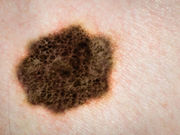However, risk of early distant relapse is close to 50 percent
TUESDAY, Oct. 4, 2016 (HealthDay News) — Radiotherapy is effective in regional control of node-positive malignant melanoma, but patients are at risk of early distant relapse, according to a study published Sept. 25 in the Journal of Medical Imaging and Radiation Oncology.
Lorna G. Keenan, from St. Luke’s Hospital in Dublin, and colleagues retrospectively evaluated node-positive malignant melanoma patients treated with adjuvant nodal irradiation after lymphadenectomy (June 2012 and March 2015).
Based on the 21 identified patients (median follow up, 13.5 months), the researchers found no cases of lymph node field recurrences. However, the distant metastasis (DM) rate was 48 percent. In patients with extracapsular extension (ECE; 71 percent), the DM rate was significantly higher (P = 0.027) than that seen in those without ECE (0 percent). In those with a maximum tumor size of >3 cm (71 percent), the DM rate was higher than that seen in those with tumor size <3 cm (30 percent; P = 0.160). The rate of DM did not correlate with the number of nodes, BRAF status, or nodal site. After completion of radiotherapy, the median time to DM was 16 weeks.
“There are currently no useful prognostic markers to differentiate the risk of regional versus distant recurrence, and the optimal treatment paradigm remains undefined,” the authors write.
Copyright © 2016 HealthDay. All rights reserved.








